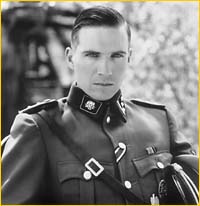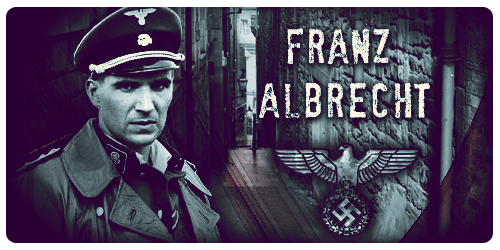Post by §:Sebastian Schweinsteiger on Jul 22, 2010 13:53:01 GMT
It was a bitter cold morning in the Warsaw ghetto. There was not a cloud in the sky, yet the sun gave very little warmth. It was February in Poland, and these conditions were almost expected. Below the clear sky, the Warsaw ghetto was alive. Jews crowded the streets, some going to their jobs, others, who had been affected by disease, such as typhus, sat on the street corner, staring out into nothingness, and still yet, others sat on the street corner, begging for meager rations of bread and water. Perhaps these Jews lost their ration card? One may never know. They were however, passed up by many a Jew, yet they would not give up in their search for food. One beggar caught the scent of some fresh soup. A lady had been given a meager bowl of soup from an SS soldier for her ration card. She hadn’t eaten in 2 days, and she was going to enjoy her soup. Out of nowhere, the beggar assaulted her—ripping, clawing, scratching, trying to take the hot soup from her grip. The lady was taken off guard by this, and through the struggle, the soup went flying in the air. It fell with a splatter by the street sign—Frank street, which was named after the founder of the Warsaw Ghetto. Seeing this, the hungry beggar dove down and began licking the hot soup from the pavement. He had no eaten in 2 weeks, and this food tasted excellent. He could almost ignore the sobbing lady who wanted to enjoy her soup.
About a mile away from this scene was the SS and Gestapo headquarters. It was a tall edifice, with Nazi banners hanging on both sides of the entrance. Outside the building, two SS soldiers stood guard, each having a MP40 in hand, ready to pounce on the slightest disturbance. Through the slightly ajar oak doors, one could see a scene unfold. It was 0600 hours, and Obersturmfuhrer Sebastian Schweinsteiger was receiving his report from a young sergeant by the name of Kreips. The Sergeant pointed to the map, stating emphatically. “The ghetto is becoming far too overcrowded. We must begin to liquidate. If we do not, disease will become even more rampant. “ Schweinsteiger took a sip of his hot coffee, which he had placed to the right of his desk. The hot, steaming liquid did offer little reprieve from this cold weather, but Schweinsteiger did not seem to mind it that much anyway, as he knew what true cold was like. He was in a trench for the remainder of WWI. That was cold. This was just brisk, as he would put it. Schweinsteiger then nodded at the plan of the young Sergeant. “Agreed.” He examined the map, eventually taking a pen and drawing a square. “Sergeant, today, I will lead the liquidation of all these streets—Frank, Stettin, and Leipzig. You will lead 1st Platoon at Stettin. If anyone gives you resistance, kill them, and leave their bodies for the crows. Have Sergeant Muller lead the assault on Leipzig. His orders are the same. I will take Frank. If anyone is too young or too old to be liquidated, kill them too.” The young Sergeant nodded at the plans of his superior. Schweinsteiger then smiled at Kreips, saying “Oh and Sergeant, one last thing. Don’t touch their women. We do not inbreed with pigs. You are dismissed, Sergeant.” Schweinsteiger motioned his hand in a waving motion, telling Kreips to assemble his men.
From there, Schweinsteiger went up into his office. He grabbed his heavy Kar98k from where he had last placed it. He then grabbed his Lugar pistol. He twirled it around by the stock before placing it in its holster. Before leaving, Schweinsteiger admired the poster of his Fuhrer, Adolf Hitler, whose picture was hung affectionately on the wall. He was one of the few men who had given Germany hope in the last two or three decades, and for that, Sebastian felt grateful. It was because of this that Schweinsteiger would follow Hitler no matter how bad things got. He never wanted to let his leader down, as his leader never let him down.
Schweinsteiger proceeded down the stairwell which connected his office to the main floor. From there, he proceeded down a corridor and out the back entrance of the SS headquarters. The back of the headquarters was somewhat of a barracks. Here the SS had an arsenal—halftracks, MG42s, STG44s, even the occasional tank, were stored in this barracks. Not only this, but it also served as a living quarters for many of the NCOs within the SS. By now, many of the SS men had received their assignments for liquidation, and they began to prepare themselves for the task at hand. Schweinsteiger observed and was pleased at the pace his men were moving. At this rate, Schweinsteiger thought he could be home in time for lunch, which was a rarity with liquidation. Usually he would finish his task mid afternoon, not early afternoon. He delighted that he might actually have an afternoon to himself for once.
Now, Sergeant Kreips walked up to Sebastian, saying “Herr Obersturmmfuhrer, everything is ready. We await your orders.” Schweinsteiger nodded his approval. “Right” he said. “Let’s move out.” Schweinsteiger proceeded to move to the halftrack which he was going to board toward Frank Street. Before he could do it however, he felt the touch of a hand on his back. Schweinsteiger turned around to see who it was….
About a mile away from this scene was the SS and Gestapo headquarters. It was a tall edifice, with Nazi banners hanging on both sides of the entrance. Outside the building, two SS soldiers stood guard, each having a MP40 in hand, ready to pounce on the slightest disturbance. Through the slightly ajar oak doors, one could see a scene unfold. It was 0600 hours, and Obersturmfuhrer Sebastian Schweinsteiger was receiving his report from a young sergeant by the name of Kreips. The Sergeant pointed to the map, stating emphatically. “The ghetto is becoming far too overcrowded. We must begin to liquidate. If we do not, disease will become even more rampant. “ Schweinsteiger took a sip of his hot coffee, which he had placed to the right of his desk. The hot, steaming liquid did offer little reprieve from this cold weather, but Schweinsteiger did not seem to mind it that much anyway, as he knew what true cold was like. He was in a trench for the remainder of WWI. That was cold. This was just brisk, as he would put it. Schweinsteiger then nodded at the plan of the young Sergeant. “Agreed.” He examined the map, eventually taking a pen and drawing a square. “Sergeant, today, I will lead the liquidation of all these streets—Frank, Stettin, and Leipzig. You will lead 1st Platoon at Stettin. If anyone gives you resistance, kill them, and leave their bodies for the crows. Have Sergeant Muller lead the assault on Leipzig. His orders are the same. I will take Frank. If anyone is too young or too old to be liquidated, kill them too.” The young Sergeant nodded at the plans of his superior. Schweinsteiger then smiled at Kreips, saying “Oh and Sergeant, one last thing. Don’t touch their women. We do not inbreed with pigs. You are dismissed, Sergeant.” Schweinsteiger motioned his hand in a waving motion, telling Kreips to assemble his men.
From there, Schweinsteiger went up into his office. He grabbed his heavy Kar98k from where he had last placed it. He then grabbed his Lugar pistol. He twirled it around by the stock before placing it in its holster. Before leaving, Schweinsteiger admired the poster of his Fuhrer, Adolf Hitler, whose picture was hung affectionately on the wall. He was one of the few men who had given Germany hope in the last two or three decades, and for that, Sebastian felt grateful. It was because of this that Schweinsteiger would follow Hitler no matter how bad things got. He never wanted to let his leader down, as his leader never let him down.
Schweinsteiger proceeded down the stairwell which connected his office to the main floor. From there, he proceeded down a corridor and out the back entrance of the SS headquarters. The back of the headquarters was somewhat of a barracks. Here the SS had an arsenal—halftracks, MG42s, STG44s, even the occasional tank, were stored in this barracks. Not only this, but it also served as a living quarters for many of the NCOs within the SS. By now, many of the SS men had received their assignments for liquidation, and they began to prepare themselves for the task at hand. Schweinsteiger observed and was pleased at the pace his men were moving. At this rate, Schweinsteiger thought he could be home in time for lunch, which was a rarity with liquidation. Usually he would finish his task mid afternoon, not early afternoon. He delighted that he might actually have an afternoon to himself for once.
Now, Sergeant Kreips walked up to Sebastian, saying “Herr Obersturmmfuhrer, everything is ready. We await your orders.” Schweinsteiger nodded his approval. “Right” he said. “Let’s move out.” Schweinsteiger proceeded to move to the halftrack which he was going to board toward Frank Street. Before he could do it however, he felt the touch of a hand on his back. Schweinsteiger turned around to see who it was….











